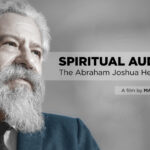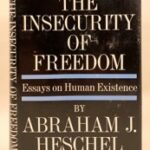Rabbi Rolando Matalon
Prayer is a serious and consequential matter. There is a tension between the fixed and the spontaneous prayers, which must be felt.
B’nai Jeshurun
New York, New York
A Jewish Perspective
Transcribed from an Interview
I was born and raised in Argentina. My rabbi growing up was Rabbi Marshall Meyer, a graduate of JTS and a devotee of Heschel. Meyer worked with Heschel as a student and was very close with Heschel. He went to serve in Argentina and brought Heschel’s teaching with him. I never met Heschel personally, but through Meyer, I met him when I was six years old and never stopped meeting him, learning from him, and deepening my understanding of his work.
It wasn’t until I entered the Seminario to study with Rabbi Meyer that I fully realized how deeply rooted Rabbi Meyer was in Heschel’s teachings. Rabbi Meyer worked to put Heschel’s ideas into action: his ideas about prayer, his approach to halakhah, his inclination to social justice. Each of these aspects became part of the living community in Argentina, which Meyer passed down to his students, steeping us all in Heschel. All of Rabbi Meyer’s students are stamped with Heschel.
After 25 years in Argentina, in 1985, Rabbi Meyer returned to New York at the time I was entering my last year of rabbinical school. After my ordination in 1986, Rabbi Meyer invited me to join him at B’nai Jeshurun. He died at the end of 1993, but in those seven years we worked together to translate Heschel into a living community; Heschel’s program as it lives in a synagogue, which continues to be central to this synagogue.
For example, our approach to prayer is consistent with Heschel’s teachings in his amazing book Man’s Quest for God, ideas he synthesized from his inherited rabbinic and Hasidic Judaism. Heschel discusses the ideal form of Jewish prayer, which is deeply rooted in tradition, very alive and connected with kavanah (intent). Prayer is a serious and consequential matter. There is a tension between the fixed and the spontaneous prayers, which must be felt. Bringing this book into our services changed the culture of B’nai Jeshurun.
Another of many aspects of Heschel’s teaching we incorporated was his approach to Jewish law. Jewish law is not total. It’s very subtle, focused on seeing yourself through the mitzvot (commandments) as serving God and serving other human beings. Performing mitzvot is not just an obligation, but an opportunity to do service with a sense of reverence for God and service. It’s not all or nothing, but it can be selective and informed by justice and ethics.

